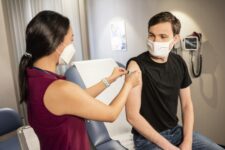
Image: CDC
That’s because, if the vaccine had been available twenty years earlier, their lives and mine would have been dramatically different.
My father’s death in 1990, while I was still in high school, had multiple significant effects on my childhood. So did the several years of illness that preceded it. He had Type 1 diabetes, and it is not a pleasant condition to deal with. He had started having minor complications when I was a baby and he was in his late twenties. By the time he died fifteen years later, he was blind, had lost a leg, had endured a kidney transplant, and had been through several strokes.
It’s worth noting that there is no history of diabetes in my father’s family. His condition was the result of a known complication from the mumps. Unfortunately, at the time he caught the mumps (late 1950s), there was no vaccine available. The first mumps vaccine was released in the late 1960s; by then, my father was in his late teens. He never received the vaccine since he had already had the disease and developed his immunity that way, albeit at a much higher cost than expected.
Thus, it can be argued that my father died from a complication of the mumps. It wasn’t a “mild childhood disease” for him; it was fatal. The fact that it took thirty-plus years to kill him is little more than a detail.
I myself depend on herd immunity to the varicella zoster virus. As near as my medical providers can figure out, the reason is that I had a mild case of chicken pox at only eleven months old, and another mild case around age seven. The running theory is that, since my immune system was still developing when I got it, the mechanism for recognizing varicella as an intruder was inadvertently switched off. My body’s biochemistry coded its presence as normal.
This was confirmed when I was twenty-one and had a titer drawn in response to the newly-imposed varicella vaccine requirements at my college. I tested right on the line between immune and not immune despite having had chicken pox twice and, by then, having also had shingles twice.
My doctor simply shook his head. “If they won’t take this low of a result, I’ll give you the vaccine so that you can use those records in lieu of titer results. It shouldn’t hurt you. But in your case, I don’t think it’ll help you, either. If you’re testing like this after four cases, the vaccine probably won’t have any effect at all.”
Since the school accepted the titer results, I’ve never had the vaccine. When I mentioned this to my current provider and asked if I should start receiving the shingles vaccine now that I’m in my fifties, her answer was, “it’s up to you. But if it wouldn’t have made any difference then, it probably won’t make any difference now. You’re always going to be at risk for it.”
Shingles, as most people know, is serious in older adults. Even without complications, it’s painful and unpleasant. I would prefer not to get it again. That said, because of the presence of herd immunity in the United States, I never worried too much about it until the rise of the anti-vax movement. Even then, as long as it was a fringe movement, I always figured I was likely reasonably safe.
Then COVID-19 hit, and the anti-vax movement moved into the mainstream. The recent confirmation of Robert F. Kennedy, Jr., as Secretary of Health and Human Services has made it even more so.
Between my father’s complication from mumps and my own complications with varicella, you can probably imagine how I reacted when I ran across the following quote on Facebook:
We’ve got to stop calling chicken pox and measles diseases, because they’re not. They’re infections, and infections come and go in a week to 10 days, and leave behind a lifetime of immunity. A disease is something that comes and stays, and frequently can’t be cured. So when you vaccinate to avoid an infection, what you potentially are doing is causing a disease. [attributed to Sherri Tenpenny, D.O.]
The person who posted this is someone I know to be scientifically literate. She understands the difference between an infection and a disease. Her objections to mandatory vaccination are primarily on political grounds; she doesn’t think the government should be mandating any sort of medical treatment. But this statement, which clearly implies that vaccinations are worse than the associated infections, and that thus it might be better to experience the latter, was still pretty scary to see. A few days later this same person pointed out that complications from the infections in question are rare.
Statistically, they are. But given that said complications have happened to both a member of my immediate family and to me, I still consider herd immunity to be vitally important. It scares me to think that this protection against varicella, which is likely the only protection I have, could be going away simply because people don’t want to give their children extra shots. I wish I could tell my story to all of these parents and then ask them a single question: what if your child was the one-in-whatever who ended up with a complication?
Then I hit them with the next questions: who are you to decide that I should have to take that risk? Or to decide that my loss of my father as a teenager is acceptable collateral damage? Because when you refuse to vaccinate or be vaccinated for MMRV, that is exactly what you are doing.
The whole point of vaccination is that it’s not about you. It’s about the others in your community.